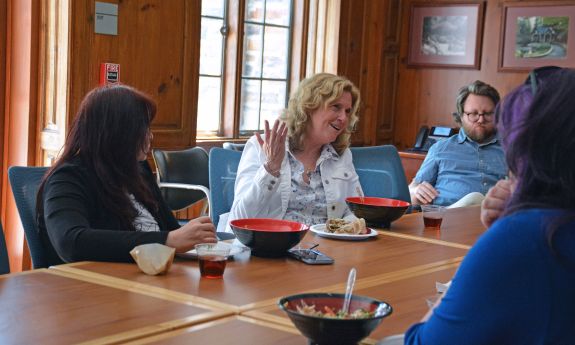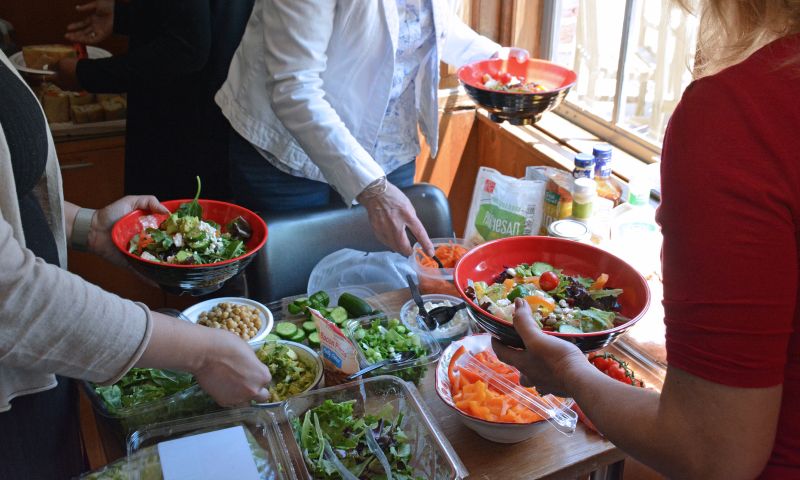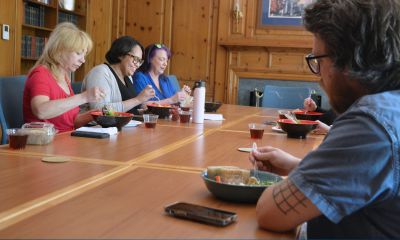Why You Should Ditch Your Desk and Take a Lunch Break
Studies show that people who eat meals together are happier. So why not have lunch with colleagues?

Mental Health Month
Build awareness of mental health issues in May with this toolkit.
At the most recent congregation, the team started with the best places to take kids strawberry picking and moved on to the time Fellowship Program Director Caroline Morris went to a memorable Poison concert in the ‘80s. An iPhone case was offered to any takers (there were none) before conversation somehow diverted briefly to Scientology and then Morris brought everyone back to her musings on what she should wear to the K-pop concert she just got tickets to next month.
Sometimes, they have cultural presentations on countries or landmarks that team members have recently visited or an interesting part of someone’s family heritage.

Always, there’s fresh, healthy salads to munch on as they converse and listen.
As a department that works with plenty of financial reports and other data every day, Shanna Fitzpatrick understands the value of arranging occasional time away from numerals.
“Sometimes we can be very, very technical, which is why it's important to infuse the social aspect of our teamwork,” said Fitzpatrick, Senior Associate Dean for Finance and Administration and Chief Financial Officer. “You're seeing all these numbers, but it's nice to connect with people, too.”
Why You Should Take a Lunch Break
Research shows that people who dine with others have stronger social networks, better health outcomes and experience more positive emotions than those who don’t.
Somehow, though, a lot of us are still eating sad desk lunches. While estimates range, one study found that as many as 74% of non-remote corporate workers eat lunch alone at their desk at least half of their working days. Another study found that 48% of people don’t eat lunch at all at least once a week.
Taking a break to have lunch with co-workers can be not only beneficial for mental health, but also strengthen bonds with the people you sit next to in the office, exchange emails with and see in Zoom meetings.
Especially during Mental Health Awareness Month in May, it’s important to remember some of the benefits of grabbing lunch with your co-workers.
Why You Should Take a Break from Technology

Christian Mauro, a Duke Child and Family Clinical Psychologist, took a stroll through Duke’s Brodhead Center recently during lunchtime and was overwhelmed by the sight of ubiquitous smartphones.
Everyone was more focused on their devices than the people in front of them. We’re a technology-obsessed culture, Mauro realized, and it’s disconnecting us from each other.
One recent study found that workers spend about 13 hours per day staring at some kind of screen.
“It's just easier to eat lunch and scroll through social media,” Mauro said. “And I'm not sure that's really healthy for us in terms of our well-being.
“We're spending so much of our time on screens at work, we're really missing the in-person contact and connection that we need,” Mauro continued. “It's really important that you nourish relationships and nourish yourself – both physically and emotionally. I think having lunch with peers and friends and people face-to-face is really important.”
Get Connected with Colleagues
Not too long ago, Andrea Savage walked with a colleague to grab lunch at the Harris Teeter down the street. Savage, a counselor with Duke’s Personal Assistance Service, isn’t even sure how they got on the topic, but she learned that her co-worker had adopted her children – which she could relate to with an adopted sister. They had an immediate, newfound bond.
“I don't think I would have ever found that out if we had not been walking to lunch,” Savage said.
At a time when 41% of Duke’s workforce works one to four days remotely and 32% are fully remote , according to a Working@Duke survey, finding intentional ways to make connections with co-workers is more important than ever. Having lunch with colleagues is one way to do that.
It’s Physically Healthier
The simple fact, Savage says, is that it’s healthier to eat lunch with others.

You’re more likely to eat slowly and, in turn, eat less as you’re talking with others.
You can exchange recipes and food ideas that might be more nutritious than what you typically pack for lunch.
You’re more productive at work, studies have found, when you allow yourself to take a break from work.
And, Savage said, studies have found that when people eat lunch at their desks – à la “sad desk lunch” – their desks have more bacteria.
Which rings true to Savage.
“I hardly ever wipe down my desk,” she said. “But when we eat in our break room, I wipe down the table after every meal, so I know that's clean.”
Get Out of Your Head
They key, experts like Savage and Mauro said, is to make a regular, recurring effort to have lunch with others. Schedule monthly lunches, like the Graduate School’s “Salad Days.” If you work a hybrid schedule, coordinate with co-workers to come in on the same day and grab lunch – even if it’s just a picnic outside with your food packed from home. If you’re fully remote, schedule a Zoom lunch with colleagues.
That connection with others is vital to our well-being, Savage said.
“Unfortunately, we live in our head too much and our head tends to lie to us,” Savage said. “It usually wants to tell us that the most negative thing either about ourselves or about our world. So, it's important to get out and get out of our head. Then we can talk to people and examine things and hear how other people see things.”
Send story ideas, shout-outs and photographs through our story idea form or write working@duke.edu.
Follow Working@Duke on X (Twitter), Facebook, and Instagram.